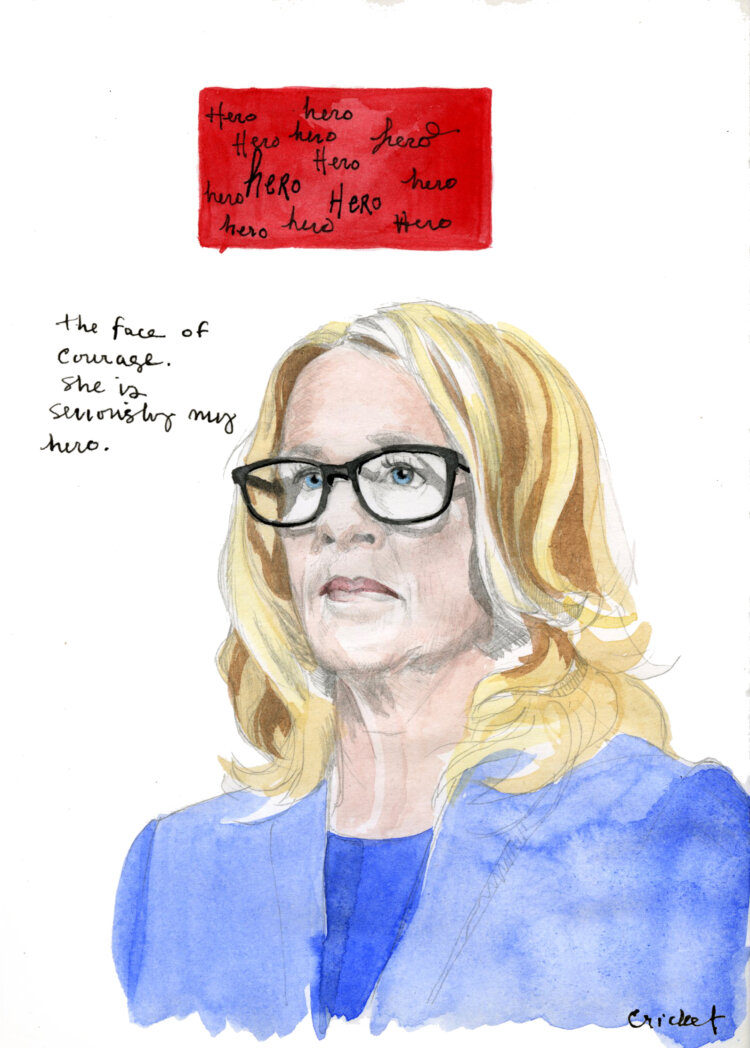
I spoke up. I reported it.
It was also during the 1980s. I spent the morning in a police station, the police trying to convince me to press charges. I was hesitant. What good was it going to do? The officers said it was the right thing to do, that no one should be able to treat me the way these boys had treated me. They were right. I was hesitant. But I agreed to press charges and arrests were made.
I wish I could say that justice was done. Far from it. I felt both violated and ashamed. Both angry and embarrassed. I was asked what I was wearing that night. I was asked why I went to the party when I was already in a relationship. Everything I did and said was examined under a microscope, all flaws discussed and magnified. My assailants walked away with few repercussions. I started experiencing panic attacks. I had recurrent nightmares that I was being assaulted while I was completely immobilized, unable to move or speak. Completely powerless to defend myself. Those around me told me I would cry as I slept.
I was told my attackers’ defense was, “why would I need to do something like this? I could have any girl I want.” Why indeed? Perhaps it was because I said no?
There was never any sense of closure for me. The process made me feel assaulted all over again. Cliched, but true. I told people that I wished I had never pressed charges. Were I to do it over again, I’m not sure I would. What good did it do? Nothing for me, that was clear.
But it did. Months later I found out several women who had been assaulted by one of my assailants reached out to the police when they read of his arrest. As each one spoke with the lead investigator, he realized that our assailant had used the exact same modus operandi in each case: exact same ploy, exact same location. There is solidarity in numbers. Especially for the one woman who had attempted suicide afterward and had never told anyone about what had happened. She was finally able to tell her parents what had driven her into such dark depths. She was finally able to take steps toward recovery.
The men who assaulted me likely have been able to bury this in the past. One of them is a lawyer, as is another man involved in this incident. They are all successful professionals, and I would guess that those around them would look at me with suspicion and anger were I to tell them what had happened all those years ago. These are attractive, professional men with children and wives and presumably good reputations. I have no desire to hunt them down and ruin their lives. But I can promise you that if one of them were nominated for a position such as Supreme Court Justice, it would be my duty to speak. Because I know their true character, and what happened all those years ago. And it would likely destroy the peace I have found since those assaults. But I would do it because it would be my duty.
Speaking out may not lead to any immediate good. But it is important for our voices to be heard. You never know who needs to hear your voice. And you may never know what your voice has accomplished, but others will hear, and act. Some day.
My heart breaks for all of my sisters who have been assaulted. There are too many of us. Our culture must change. We need to teach our girls that it’s okay not to be “polite” when they are feeling uncomfortable. I think some men may not understand that statement, but far too many women do.
You never know who needs to hear your voice. And you may never know what your voice has accomplished, but others will hear, and act.
I was raised to be accommodating. Yes, I was raised in a privileged environment in which I was told I was smart, resourceful and my opinions were valued, but I was also the product of other social cues. Don’t make people feel uncomfortable. Put people at ease. Don’t antagonize when you disagree. Don’t make people “feel bad” when you disagree; instead, try to change minds through gentle persuasion.
Many of these statements are positive ones we should encourage in everyone. But what happens when you put a girl, or even a woman, who’s been raised by these guidelines in a social situation where she feels uncomfortable?
I can tell you through experience. Going back to that night, I was uncomfortable very early on. One of the men I was with grew increasingly drunk and belligerent scarily early. And seemed intent in getting me to drink more, and then when I wouldn’t, smoke pot. Each time I refused he would storm off, act angry. If I had been in a familiar place, I would likely have just gone home. But I wasn’t. I didn’t know how to get back to where I was staying, and didn’t have any way, personally, of getting myself there. And I knew others were having a good time and didn’t want to ruin their nights. I didn’t want to speak up. I didn’t want to make anyone feel uncomfortable. I didn’t want to make anyone angry. So instead I accommodated and stayed silent, even when red lights were flashing inside my head. And by the time it was apparent what the plan was, it was too late. The final indignity was when one of my assailants left me, exhausted and crying, and muttered bitterly, “Don’t expect me to drive you home!” He was angry. I was bewildered, scared and alone.
We need to tell our girls that it’s okay to make people feel uncomfortable when you feel uncomfortable. It’s okay to make people angry when you are following your gut. It’s okay to be an inconvenience when your instincts tell you that something is off. Girls need to trust their feelings of discomfort, and not worry about “making a scene” or “overreacting.”
We need to broaden the discussion and consider the cues we are feeding our children, even subconsciously. You know what’s brave? A young girl in a social situation who speaks up and dares to inconvenience people when she feels uncomfortable. It almost feels wrong to type that. Which is, ultimately, what is wrong with our society.


Grok Nation Comment Policy
We welcome thoughtful, grokky comments—keep your negativity and spam to yourself. Please read our Comment Policy before commenting.